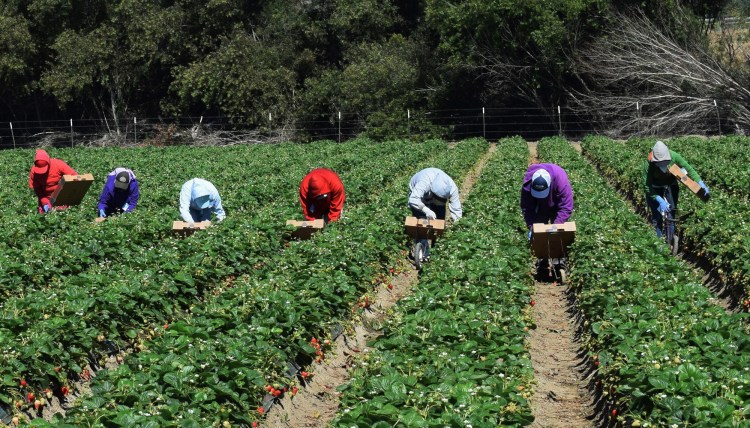
Many farmworkers in the US receive inadequate wages and experience harassment, violence and even sexual assault. But thanks to the Fair Food Program, which signs up big companies like McDonald’s and Taco Bell, conditions in the tomato fields in several states have been reformed. Here’s how it works — and how you can do your part.
Most of us worry about where our food comes from, how it’s grown, and whether it’s good for the planet and for us. But are the fruit and vegetables that we eat good for the people who harvest them?
Unfortunately, many of the farmworkers in the US who ensure that fresh produce is available for us year-round labor under brutal conditions with inadequate wages and experiencing harassment, physical violence, even sexual assault. They also toil without decent access to shade and rest breaks. But thanks to a program created by a farmworker coalition, fair and humane practices are finally being enacted in some parts of the agricultural industry.
Established in 2011 and lauded by the United Nations, the Fair Food Program (FFP) is making its impact by speaking a language that everyone understands: Market pressure. The FFP has signed up massive corporations like Walmart, McDonald’s, Chipotle, Trader Joe’s and Subway (you can see a full list of participating buyers and growers here), which have agreed to purchase their tomatoes only from growers adhering to certain standards.
If a farm is found to be mistreating their workers, it is prohibited from selling tomatoes to any of those companies until it reforms its practices. This gives the grower a major market incentive to improve as quickly as possible and saves the FFP from having to engage in a prolonged, expensive legal battle to get them to comply.
The FFP’s 2018 annual report quoted investigative journalist Barry Estabrook, who said, “The Coalition has made such progress, it’s like the difference between a Dickensian workhouse and a modern Silicon Valley office complex.” Estabrook wrote the 2011 book Tomatoland about abuses in the fields and returned more recently to update it by reporting on the improvements made by the FFP.
“’Farmworkers have essentially been the invisible men and women of the US labor force for generations,” says Greg Asbed of the CIW and a founder of the Fair Food Program. “If you’re invisible, then whatever happens to you, no one notices.”
For a long time, Florida was known as ground-zero for modern day slavery in the US, says Gerardo Reyes Chavez, a former farmworker, a leader at the Coalition of Immokalee Workers (CIW) and one of the FFP’s founders. That’s because Florida was the number-one producer of fresh tomatoes in a country where the average person eats 20 pounds every year. The deplorable conditions at farms were neither a new development nor a side effect of corporate agribusiness; they were a direct continuation of the practices of the South. “The [agricultural] industry emerged directly from slavery, and the slavery didn’t really disappear; it just changed form,” he tells TED Ideas.
Before the FFP was introduced, wages hadn’t risen in three decades in Florida, and wage theft was common. Workers were paid 40 to 45 cents for each 32-pound bucket of tomatoes, or roughly 1.3 cents per pound. This meant a person had to pick more than 5,500 pounds of tomatoes in a day just to make the equivalent of minimum wage. The abuse was more than financial: Workers were frequently beaten, and Reyes Chavez says that 80 percent of women in the fields reported experiencing sexual harassment and assault (and he believes that many crimes went unreported). They also spent long days in the searing sun without respite or relief.
“Farm work is one of the most dangerous jobs in the country,” says Greg Asbed, a leader at the CIW and one of the founders of the FFP. “Farmworkers are seven times more likely to die in the field than the average US worker, and they’ve essentially been the invisible men and women of the US labor force for generations. If you’re invisible, then whatever happens to you, no one notices.“
A tomato grower was said to have refused to negotiate with striking farmworkers because, as he put it, “A tractor doesn’t tell a farmer how to run his farm.”
Abuse and inequity are by no means exclusive to the tomato industry. The FFP chose to begin in those fields since the conditions there are particularly brutal given the pace that pickers are urged to work at. Even though they risked great retaliation for acting or speaking up, some workers still did so as part of the CIW — which was named after the Florida town in which it is based. They organized strikes, marches and even a 30-day hunger strike. After the latter, a tomato grower was said to have refused to sit down at the negotiating table with farmworkers because as he put it, “A tractor doesn’t tell a farmer how to run his farm.”
This basic disregard for workers’ humanity is what Reyes Chavez wants to root out of the industry. Moreover, it’s a common misconception that many of these exploitative conditions are experienced solely by undocumented workers. “It’s not about people being undocumented, because half of our slavery cases [taken to court by federal prosecutors with the help of the CIW before the FFP started] involved American citizens,” explains Asbed.
In fact, many farmworkers in the US are in the country on a specific legal visa for seasonal agricultural work, the H-2A. Despite having legal status, Asbed says, “Farmworkers live in extreme poverty. Most statistics show that they make about $15,000 to $17,000 a year. No benefits, no health insurance, no paid vacation, no overtime, no pension.”
Yet it takes shockingly little to improve these conditions — being paid just one cent more per pound of tomatoes can almost double a farmworker’s wages. The FFP requires its 14 participating buyers to pay growers in Florida, New Jersey, Maryland, Virginia, South Carolina and Georgia this “penny per pound” more for tomatoes. With the additional money, growers are able to increase workers’ wages. Workplace standards have also improved dramatically with the FFP code of conduct, including mandatory education sessions on employment rights in English, Spanish and Haitian Creole; a rigorous complaints procedure with a 24-hour hotline to report violations; and a clock-in system that ensures workers have a record of when they arrive and leave the fields. Enforced by the independent Fair Food Standards Council, these changes have transformed the tomato industry in Florida in just eight years and the program is now turning its sights towards other industries and states.
It took years of lobbying from the FFP to get companies like Taco Bell and McDonald’s on board. Many large buyers, such as Costco, Publix and Wendy’s, are still holding out.
Class-action lawsuits filed against growers used to be an annual occurrence; there have been none since the program began. Whereas workers used to leave the fields, Asbed says that “today people are returning from other jobs like landscaping and construction to the fields, precisely because it’s become a humane place to work.”
But this progress hasn’t been easily won. Even though FFP’s participating buyers represent 14 of the world’s biggest buyers of tomatoes, it took years of lobbying to get initial signatories like Taco Bell and McDonald’s on board. Many large buyers are still holding out, such as Costco, Publix and Wendy’s. (Both Publix and Costco were approached for comment, but did not respond. On its website, Publix says — specifically of the Fair Food Program — that it views the situation as a labor dispute between farmworkers and their employers.)
The subject of boycotts, Wendy’s has taken a circuitous route when it comes to their tomato supply. “They actually were buying from Florida before the FFP was implemented in 2011,” says Asbed. “They continued to buy from Florida for a year or two after that and then told the growers they were leaving Florida and going to Mexico… They’ve come back to the US, which is a good half-step, but they still refuse to join the program and they’re working with growers who are outside of the program.”
When asked for comment, Wendy’s spokesperson Heidi Schauer said, “Wendy’s does not believe that joining the CIW’s program is the only way to act responsibly, and the company takes pride in long-term relationships with industry-leading suppliers who share a commitment to quality, integrity and ethics. In addition to having a Supplier Code of Conduct that includes requirements related to human rights and labor practices, Wendy’s conducts its own regular Quality Assurance audits at the farms, plants, facilities and other locations of all their suppliers.”
However, the Wendy’s Supplier Code of Conduct uses fairly slippery language when it comes to safe working conditions, fair wages, and the absence of discrimination and harassment — these are listed only as expectations, not requirements.
Schauer also added that Wendy’s now sources tomatoes from greenhouse farms in North America, which provide “safer, indoor working conditions.”
That, says Asbed, is not true across the board. “First, abuses in greenhouses — from sexual harassment to forced labor — are already well documented. But even if one were to accept the idea that conditions in greenhouse suppliers’ operations were free of abuse, that’s not a reason to keep the FFP out. Rather, it makes opening its suppliers’ farms up to the scrutiny of the FFP’s monitoring and enforcement mechanisms something of a “no-brainer”.”
Consumer support is needed to create the pressure on large companies, and it’s up to us to make thoughtful choices when we buy our food.
He explains, “If the audits should show that Wendy’s is right about conditions there, the growers would obtain the most-respected certification in the US agricultural industry today, and the campaign against Wendy’s will end. Everyone would win… They just need to do what every other major fast-food company has done years ago and join the program and stop drawing a competitive advantage against their competitors by refusing to join the FFP and pay the penny-per-pound premium.”
Much of the FFP’s power comes down to consumers and farmworkers joining forces. Consumer support is needed to create the pressure on large companies, and it’s up to us to make thoughtful choices when we buy our food.
So what can you do? “First and foremost, consumers have to educate themselves,” says Asbed. “They have to take an active role in knowing the conditions behind what they buy.” The Fair Food Program website lists participating growers and buyers in the United States.
At your local grocery store or restaurant, talk to the manager and ask questions like: “What country do your vegetables come from? Do you have a supplier code of conduct? Are the workers paid a living wage?”
Don’t be misled by produce that is labeled with words such as “organic” and “local.” It’s easy to interpret them as meaning that everyone involved — animals and humans — are treated well. But that’s not the case, says Reyes Chavez: “‘Local’ doesn’t mean ‘local’, sometimes even for workers. We travel from Florida to other states and sometimes we might end up working for a ‘local’ grower in another state, but that doesn’t mean that it is fair at all.”
Since it’s difficult to know which labelling to trust, who are the experts? The 2016 Justice in the Fields report held up the FFP and the Agricultural Justice Project as highly recommended because of their focus on farmworker leadership. It notes that other programs, like the Equitable Food Initiative (in which Costco participates) and Fairtrade International are not as robust when it comes to ensuring workers’ voices are heard and wages increased. The Fair World Project, producers of the report, also provide a guide to fair trade labels around the world. Ultimately, however, it’s about doing the research in your local area.
If you’re not sure whether local businesses are buying from ethical sources, you can ask. “It’s a question of going to where you buy food — whether it’s a restaurant or your grocery store — and talking to the manager,” says Asbed. “The managers will listen to you; they will not turn their backs on you. Go and express yourself as a consumer.”
Here are some suggestions of questions you might ask: “What country do your vegetables come from? Do you have a supplier code of conduct, which ensures good working conditions for farmworkers who pick your produce? Are these workers paid a living wage?” The business may not know the answer to these questions, but by asking, you’ll be prompting them to consider them.
Besides working with tomato growers along the East Coast, the FFP has since expanded to work with dairy farmers in Vermont through a partnership with local organization Migrant Justice and its Milk With Dignity program. Now, it is setting its sights on the massive agricultural industries in California and Texas. Calls are also coming in from overseas — from Australia to Lesotho — from others wanting to replicate the program’s successful worker-led model.
Asbed feels hopeful about the future for farmworkers in the US, but he believes that we all have a role in shaping that future. “What the Fair Food Program has done is create consequences. Real predictable, meaningful consequences for human rights violations… There’s absolutely great hope on the horizon, but ultimately consumers have to help drive that process.”
Watch their TEDMED talk now:












